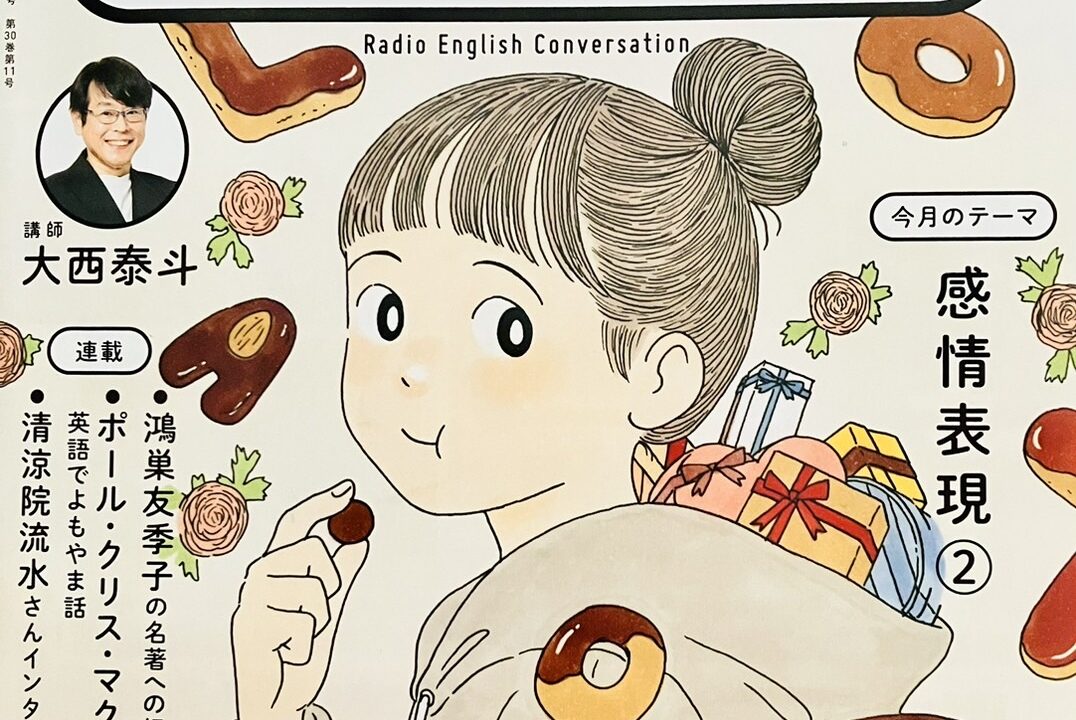February 27 Tuesday, 2024
Lesson 217 発言タイプ:感情㉚不快感
☆Words & Phrases
**bump into ~:
Derek, I forgot to tell you. I bumped into Bill and we had coffee together.
We talked a bit about your wanting to return to the band.
What? You told him that? – Yes, it’s the truth, isn’t it?
**uncalled for:
Doris, that was uncalled for.
☆Grammar and Vocabulary
① I bumped into Bill.
私はビルとばったり会いました。
into のイメージ
bump into は誰かと偶然・ばったり出会うこと。into の「衝突」が、ばったり感とつながっている。
into は「~の中に」というイメージだが、何かが衝突した際にはめり込んでいく感じが伴う。そのため、into が「衝突」というニュアンスを生み出している
② I was just being honest.
私はただ正直にふるまっていただけです。
be動詞の進行形
この文の was being は be動詞の進行形。be動詞は「=(イコール)」を表すが、その進行形には、進行形ならではの「行為が行われている」感触が伴っている。
I was honest.
は単に「私は正直でした」
I was being honest.
は「正直にふるまっていた」と行為を表す
友だち追加でLINEにラジオ英会話で学んだフレーズを実際のビジネスシーンで使うための方法、そして放送のまとめが届きます。
☆Typical Expressions
That was uncalled for.
call for ~ は「~を要求する・必要とする」、そこから uncalled for は「必要とされていない=不適切な・余計な」ということ。相手の態度・言動への不快感を表す典型的なフレーズ。
相手の態度・言動に不快感を表明しなければならない機会は時折でてくる。我慢ならないときには、臆せず伝える必要があるはず。
① There’s no need for that.
There’s no need for that kind of language.
That type of language is inappropriate.
You can’t say things like that.
Take that back.
→ 言葉遣い・発言内容をとがめる表現
② Watch your mouth.
Watch your language.
→ 相手の言動への注意です。まとめて覚えておく!
③ That’s a bit rude.
How rude (of you).
That’s downright offensive.
→ rude は「失礼な」、offensive は「相手を深く傷つけ怒らせるような」、downright(まったく・完全に)で強調している
④ You will speak to me with the proper respect.
Be respectful.
→ respect は、相手を価値あるものとして認める態度。会話の基本。相手をとがめるのにも使える。
最初の文の You will ~ は「~するように」と、話し手の「意志」が感じられる威圧的な口調
★Practice
R: Okay. It’s time to practice.
D: You may not use these phrases often in daily conversation. But they are a frag. If you hear someone use these, you know, they’re upset. Okay. Let’s jump in,
– There’s no need for that.
– There’s no need for that kind of language.
– That type of language is inappropriate.
– You can’t say things like that.
– Take that back.
R: Continuing on,
– Watch your mouth.
– Watch your language.
D: Let’s keep going,
– That’s a bit rude.
– How rude.
– How rude of you.
– That’s downright offensive.
R: And our last two,
– You will speak to me with the proper respect.
– Be respectful.
You did great!
D: Fantastic work, everyone!
☆Typical Expressions in Action
①それは余計なひと言でした。あなたには彼の過去をあんなふうに持ち出す権利はありませんでしたよ。
**bring up:
②取り消しなさい。私は絶対に、あなたの妹をあなたよりもひいきしてはいません。私はあなたたちのどちらも平等に愛しています。
**most certainly:
**favor ~ over…:
③それはちょっと失礼です。あなたは、彼が悪い人だと言わずに彼の経営スタイルを批判することができますよ。
**criticize:
**management style:
★Ending
O: That was uncalled for.
D: I’m sorry… What did I …
O: That was uncalled for.
D: Oh… oh.
O: Practicing!
D: You can’t say things like that.
R: Sensei, we’re working in the studio. Your practicing is uncalled for.
February 27 Tuesday, 2024
Lesson 217 発言タイプ:感情㉚不快感
(日本語訳・解説付き)
☆Words & Phrases
**bump into ~: ~と偶然・ばったり出会う
Derek, I forgot to tell you. I bumped into Bill and we had coffee together.
デレク、言うのを忘れていました。私、ビルと偶然出会って、一緒にコーヒーを飲みました。
We talked a bit about your wanting to return to the band.
あなたがバンドに戻りたがっていることをちょっと話したの。
※ about your wanting to ~ の your は wanting の意味上の主語です!
What? You told him that? – Yes, it’s the truth, isn’t it?
何だって?彼にそれを教えたのかい? – はい、それって本当のことですよね?
**uncalled for: 余計な、出しゃばった
Doris, that was uncalled for.
ドリス、それは余計でした=それは余計なお世話というものだ。
☆Grammar and Vocabulary
① I bumped into Bill.
私はビルとばったり会いました。
into のイメージ
bump into は誰かと偶然・ばったり出会うこと。into の「衝突」が、ばったり感とつながっている。
into は「~の中に」というイメージだが、何かが衝突した際にはめり込んでいく感じが伴う。そのため、into が「衝突」というニュアンスを生み出している
② I was just being honest.
私はただ正直にふるまっていただけです。
be動詞の進行形
この文の was being は be動詞の進行形。be動詞は「=(イコール)」を表すが、その進行形には、進行形ならではの「行為が行われている」感触が伴っている。
I was honest.
は単に「私は正直でした」
I was being honest.
は「正直にふるまっていた」と行為を表す
友だち追加でLINEにラジオ英会話で学んだフレーズを実際のビジネスシーンで使うための方法、そして放送のまとめが届きます。
☆Typical Expressions
That was uncalled for.
それは余計でした。
call for ~ は「~を要求する・必要とする」、そこから uncalled for は「必要とされていない=不適切な・余計な」ということ。相手の態度・言動への不快感を表す典型的なフレーズ。
相手の態度・言動に不快感を表明しなければならない機会は時折でてくる。我慢ならないときには、臆せず伝える必要があるはず。
① There’s no need for that.
その必要はありません。
There’s no need for that kind of language.
そうした言葉を使う必要はありません。
That type of language is inappropriate.
その種の言葉遣いは不適切です。
You can’t say things like that.
そんなことは言えません。
Take that back.
取り消しなさい。
→ 言葉遣い・発言内容をとがめる表現
② Watch your mouth.
Watch your language.
口の利き方に気をつけて。
→ 相手の言動への注意です。まとめて覚えておく!
③ That’s a bit rude.
それはちょっと失礼ですよ。
How rude (of you).
(あなたは)なんて失礼なのでしょう。
That’s downright offensive.
それはまったく不快です。
→ rude は「失礼な」、offensive は「相手を深く傷つけ怒らせるような」、downright(まったく・完全に)で強調している
④ You will speak to me with the proper respect.
適切な敬意を払って私と話すように。
Be respectful.
敬意を払いなさい。
→ respect は、相手を価値あるものとして認める態度。会話の基本。相手をとがめるのにも使える。
最初の文の You will ~ は「~するように」と、話し手の「意志」が感じられる威圧的な口調
★Practice
R: Okay. It’s time to practice.
D: You may not use these phrases often in daily conversation. But they are a frag. If you hear someone use these, you know, they’re upset. Okay. Let’s jump in,
– There’s no need for that.
– There’s no need for that kind of language.
– That type of language is inappropriate.
– You can’t say things like that.
– Take that back.
R: Continuing on,
– Watch your mouth.
– Watch your language.
D: Let’s keep going,
– That’s a bit rude.
– How rude.
– How rude of you.
– That’s downright offensive.
R: And our last two,
– You will speak to me with the proper respect.
– Be respectful.
You did great!
D: Fantastic work, everyone!
☆Typical Expressions in Action
①それは余計なひと言でした。あなたには彼の過去をあんなふうに持ち出す権利はありませんでしたよ。
That was uncalled for. You had no right to bring up his past like that.
**bring up: 持ち出す
②取り消しなさい。私は絶対に、あなたの妹をあなたよりもひいきしてはいません。私はあなたたちのどちらも平等に愛しています。
Take that back. I most certainly do not favor your sister over you. I love you both equally.
**most certainly: 絶対確実に ※ certainly を強調した表現
**favor ~ over…: ・・・より〜を好む・優遇する・ひいきする
③それはちょっと失礼です。あなたは、彼が悪い人だと言わずに彼の経営スタイルを批判することができますよ。
That’s a bit rude. You can criticize his management style without saying he’s a bad person.
**criticize: 批判する
**management style: 経営スタイル
★Ending
O: That was uncalled for.
D: I’m sorry… What did I …
O: That was uncalled for.
D: Oh… oh.
O: Practicing!
D: You can’t say things like that.
R: Sensei, we’re working in the studio. Your practicing is uncalled for.
名古屋駅前にあるビジネス英語&仕事での英語雑談力をつけるための「名古屋BEGビジネス英会話ジム」
営業時間:平日 9:00~22:00 土曜日 9:00~19:00(日祝休み)
〒450-0002 愛知県名古屋市中村区名駅2丁目40-16 名駅野村ビル 5階




